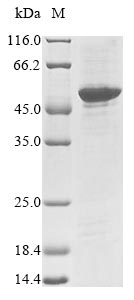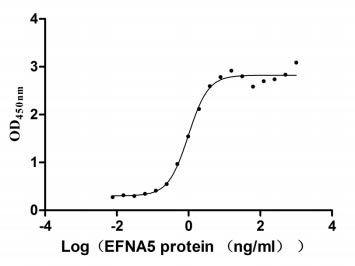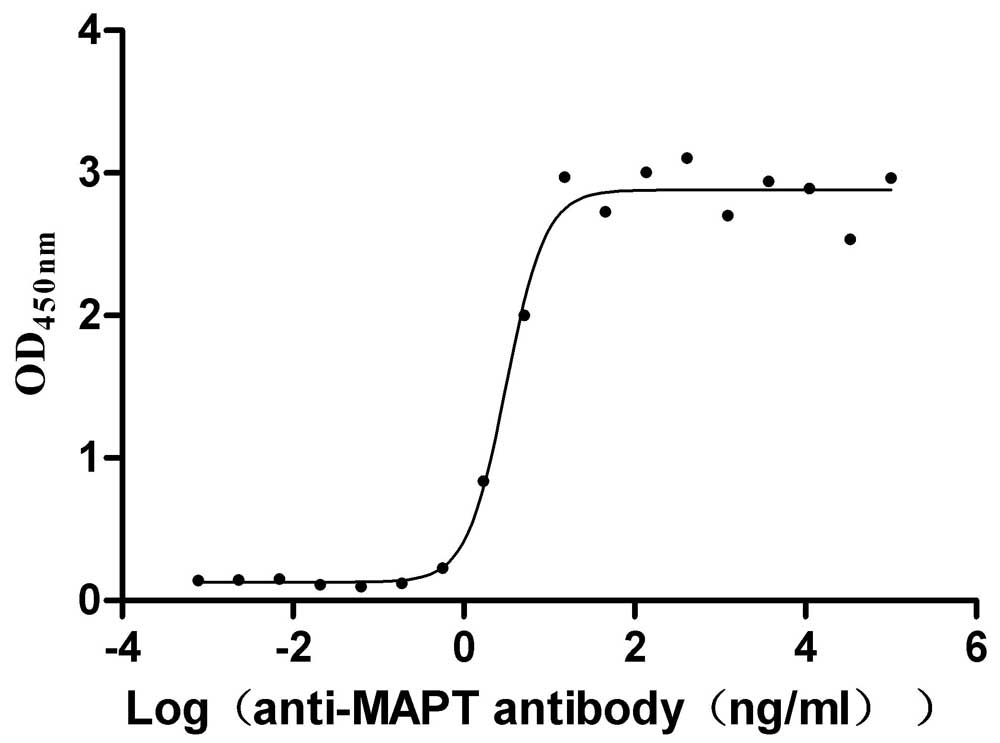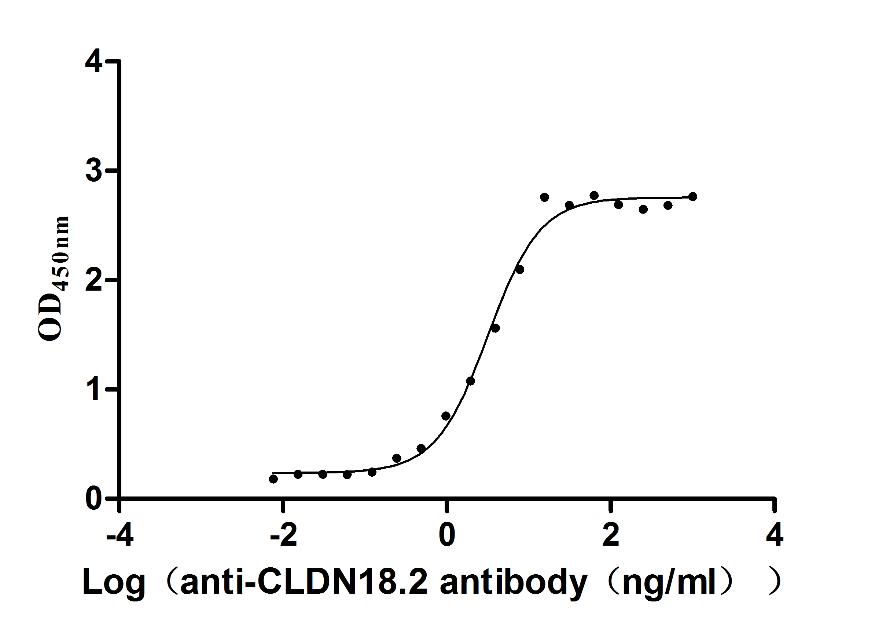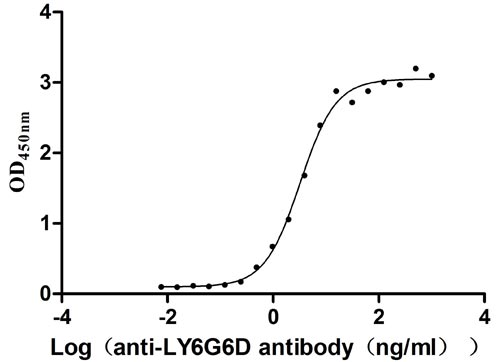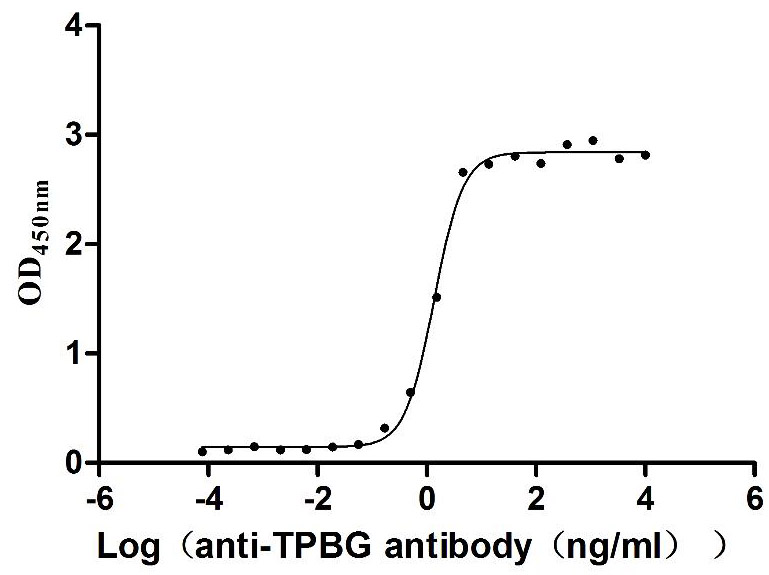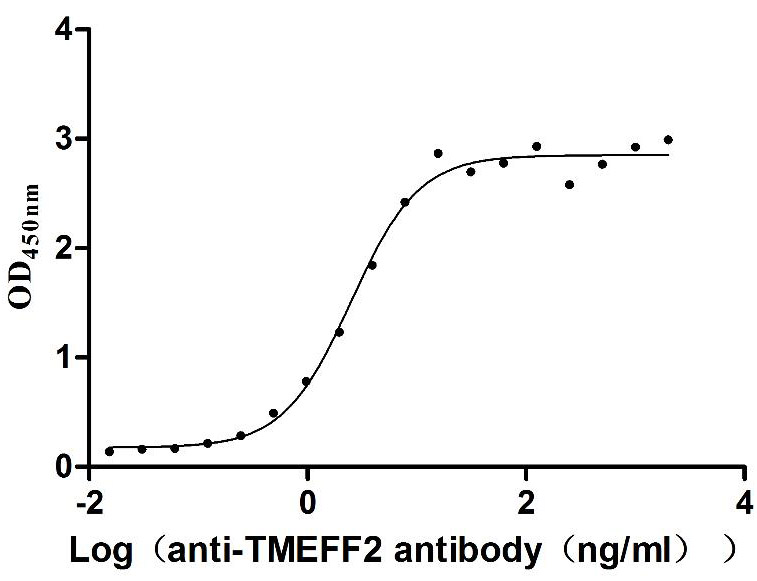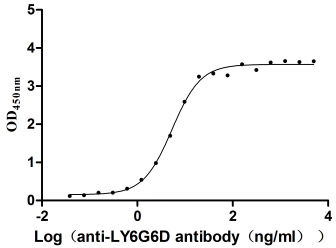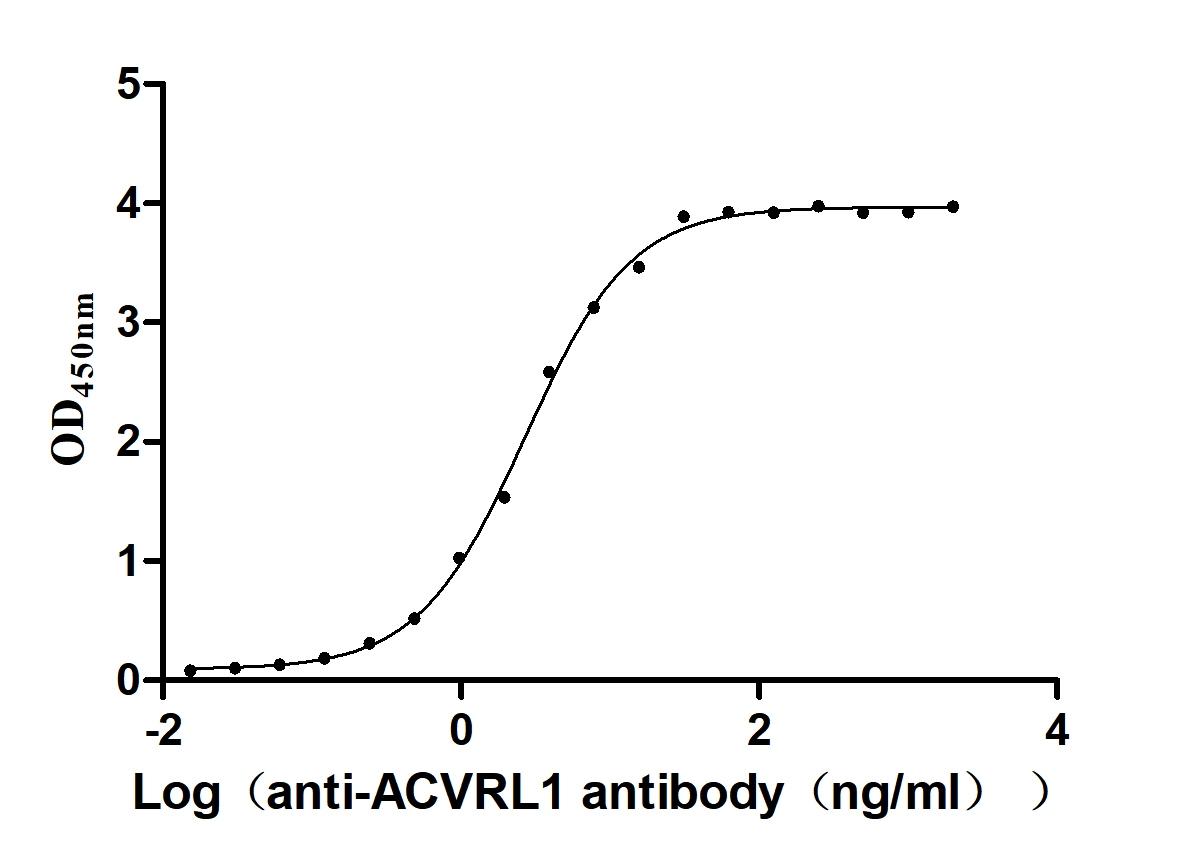Recombinant Mouse Neural retina-specific leucine zipper protein (Nrl)
In Stock-
中文名称:小鼠Nrl重组蛋白
-
货号:CSB-EP016086MO
-
规格:¥2328
-
图片:
-
其他:
产品详情
-
纯度:Greater than 85% as determined by SDS-PAGE.
-
基因名:Nrl
-
Uniprot No.:
-
别名:Nrl; Neural retina-specific leucine zipper protein; NRL
-
种属:Mus musculus (Mouse)
-
蛋白长度:Full Length
-
来源:E.coli
-
分子量:46.1 kDa
-
表达区域:1-237aa
-
氨基酸序列MAFPPSPLAMEYVNDFDLMKFEIKREPSEGRSGVPTASLGSTPYSSVPPSPTFSEPGMVGGGEAPRPGLEELYWLATLQQQLGSDEVLGLSPDEAVELLQNQGPVSMEGPLGYYSGSPGETGAQHVQLPERFSDAALVSMSVRELNRQLRGCGRDEALRLKQRRRTLKNRGYAQACRSKRLQQRRGLEAERARLAAQLDALRAEVARLARERDLYKARCDRLTSGGPGSDDHTHLFL
Note: The complete sequence including tag sequence, target protein sequence and linker sequence could be provided upon request. -
蛋白标签:N-terminal 10xHis-SUMO-tagged and C-terminal Myc-tagged
-
产品提供形式:Liquid or Lyophilized powder
Note: We will preferentially ship the format that we have in stock, however, if you have any special requirement for the format, please remark your requirement when placing the order, we will prepare according to your demand. -
缓冲液:Tris-based buffer,50% glycerol
-
储存条件:Store at -20°C/-80°C upon receipt, aliquoting is necessary for mutiple use. Avoid repeated freeze-thaw cycles.
-
保质期:The shelf life is related to many factors, storage state, buffer ingredients, storage temperature and the stability of the protein itself.
Generally, the shelf life of liquid form is 6 months at -20°C/-80°C. The shelf life of lyophilized form is 12 months at -20°C/-80°C. -
货期:3-7 business days
-
注意事项:Repeated freezing and thawing is not recommended. Store working aliquots at 4°C for up to one week.
-
Datasheet & COA:Please contact us to get it.
相关产品
靶点详情
-
功能:Acts as a transcriptional activator which regulates the expression of several rod-specific genes, including RHO and PDE6B. Functions also as a transcriptional coactivator, stimulating transcription mediated by the transcription factor CRX and NR2E3. Binds in a sequence-specific manner to the rhodopsin promoter.
-
基因功能参考文献:
- that two photoreceptor-specific transcription factors, NRL and CRX, are master regulators of this program and are required for tumor maintenance in this subgroup PMID: 29533784
- Following Nrl disruption, rods gain partial features of cones and present with improved survival in the presence of mutations in rod-specific genes, consequently preventing secondary cone degeneration. In three different mouse models of retinal degeneration, the treatment substantially improves rod survival and preserves cone function. PMID: 28291770
- Nrl is posttranscriptionally regulated to facilitate the generation of other cell types in retina PMID: 27878762
- De novo assembly and alternative splicing analyses revealed previously unannotated rod-enriched transcripts and the role of NRL in transcript maturation. PMID: 27880916
- Our studies reveal coregulation of coding and noncoding transcripts in rod photoreceptors by NRL and establish the framework for deciphering the function of ncRNAs during retinal development. PMID: 28863214
- To explore dendritic stratification of OFF bipolar cells in the absence of rods, we made use of the 'cone-full' Nrl-/- mouse retina in which all photoreceptor precursor cells commit to a cone fate including those which would have become rods in wild-type retinas PMID: 28257490
- CNGA3 expression restored cone function in in CNGA3-/-/Nrl-/- mice, an all-cone model of CNGA3 achromatopsia. PMID: 25855802
- REEP6.1 is a key functional target of NRL-centered transcriptional regulatory network in rod photoreceptors. PMID: 24691551
- Data indicate that positive feedback between neural retina leucine zipper factor (NRL) and retinoid-related orphan receptor beta gene (Rorb) genes reinforces the commitment to a rod differentiation fate. PMID: 25296752
- shRNA-mediated knockdown of Crx and Nrl resulted in reduced Kcnv2 promoter activity and low endogenous Kcnv2 mRNA expression in the retina. PMID: 24664678
- This study analyzed the retinal pigment epithelium from Nrl(-/-) mice of various ages for lipofuscin fluorescence and A2E levels. PMID: 22417141
- Findings suggest that elimination of Nrl in adult rods may represent a unique therapy for retinal degeneration. PMID: 23319618
- Our results show that NRL and CRX together control the expression of most, if not all, genes involved in rod phototransduction through a cis-regulatory module PMID: 22511886
- found that Nrl activated rhodopsin and Ppp2r5c transcription by recruiting Tip60 to promote histone H3/H4 acetylation PMID: 22354990
- Nrl as a direct transcriptional target of RORbeta and suggest that combinatorial action of multiple regulatory factors modulates the expression of Nrl in developing and mature retina. PMID: 21673114
- Nrl-deficient retina may serve as a model for elucidating mechanisms of cone homeostasis and degeneration that would be relevant to understanding diseases of the cone-dominant human macula. PMID: 22238088
- a model in which Nrl expression is primarily initiated by OTX2 and RORbeta and later maintained at high levels by CRX and RORbeta. PMID: 21865162
- Cone-like outer segment phagocytosis in Nrl(-/-) mice shows a similar profile to that of rods in normal mice and other species. PMID: 21203345
- results suggest that Ppp2r5c expression is regulated by Nrl during retinogenesis through direct binding to the promoter region of Ppp2r5c PMID: 21078119
- Studies suggest an important role of sumoylation in fine-tuning the activity of NRL and thereby incorporating yet another layer of control in gene regulatory networks involved in photoreceptor development and homeostasis. PMID: 20551322
- the function of NRL is modulated by its interaction with specific repressor proteins, related to cross-talk between signaling pathways in the retina PMID: 12566383
- both Nrl and Crx are required for full transcriptional activity of the PDE6A gene PMID: 15001570
- a 2.5-kb Nrl promoter segment directs the expression of enhanced GFP specifically to rod photoreceptors and the pineal gland PMID: 16505381
- NRL is not only essential but is sufficient for rod differentiation PMID: 17242361
- Nrl and Grk1 have roles in photoresponse recovery and age-related degeneration PMID: 17249566
- Rorbeta directs rod development and does so in part by inducing the Nrl-mediated pathway of rod differentiation. PMID: 19805139
收起更多
-
亚细胞定位:Cytoplasm. Nucleus.
-
蛋白家族:BZIP family
-
组织特异性:Expressed in the retina (at protein level).
-
数据库链接:
KEGG: mmu:18185
STRING: 10090.ENSMUSP00000054457
UniGene: Mm.20422

